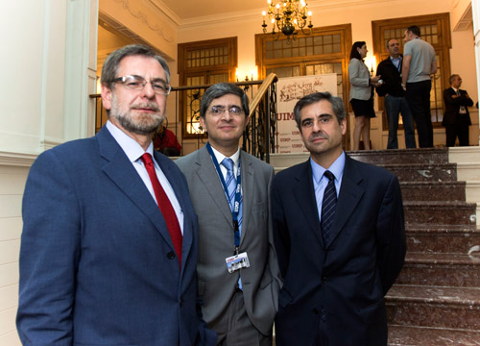

THE EPO grants a lot of 'foreign' software patents. Foreign like in India, where such patents simply aren't allowed ("per se"). India is renowned if not notorious for a low proportion of 'domestic' patents; it's like the Indian patent office serves foreign companies (against Indian firms) more than the other way around -- a fact that isn't overlooked by the press. The same cannot be said about the USPTO because many companies (even foreign) operate inside the US.
"Such patents aren't allowed at the EPO, at least in principle, but the EPO stopped obeying the law anyway."The patent trolls' lobby, IAM, has just quoted/paraphrased the EPO's Vice-President Alberto Casado as saying that 43% of the applications the EPO now receives have a software element to them. Is Casado trying to justify tolerating software patents? It sure sounds like it. Such patents aren't allowed at the EPO, at least in principle, but the EPO stopped obeying the law anyway. It's corrupt and it routinely violates the EPC as though the EPC does not exist anymore. Another person quoted/paraphrased Casado as saying that Medical Technology is the first tech area of patent applications at the EPO but the top 1 applicant is... Huawei, from China!
Huawei has been rather aggressive with patents lately. Last night Florian Müller wrote about the case against Samsung, which has taken somewhat of a turn because Judge Orrick (District Court for the Northern District of California) "upholds Samsung's anti-enforcement injunction against Huawei". This is important because what's at stake are nearly a billion computers ('phones', tablets etc.) and to quote Müller:
The fact that Samsung und Huawei are the world's two leading Android device makers always lent some significance to their patent infringement dispute, but it wasn't really too interesting to watch until the motion process that culminated in Samsung's antisuit injunction, preventing Huawei from enforcing a couple of Chinese patent injunctions for the time being.
Huawei has since been trying to get rid of that decision, which prevents it from getting huge leverage in China in the shortest term. It asked Judge William H. Orrick of the United States District Court for the Northern District of California to revisit his decision, and it filed a Ninth Circuit appeal with the Federal Circuit. The latter then told Huawei: you can't keep two courts busy in parallel with the same matter, so please wait for your California-based judge, then we'll see.
"We should also note that a couple of days ago Amar Goussu Staub's Louise Amar (Team UPC) repeated the famous lies about UPC, which is not starting at all!"Such efforts would be greatly simplified, Europe-wide, if the EPO kept issuing lousy patents and if the UPC (or anything like it) ever came into force. Thankfully, the UPC is stuck/dead, but the EPO keeps issuing bad patents -- a subject raised both by examiners and stakeholders.
We should also note that a couple of days ago Amar Goussu Staub's Louise Amar (Team UPC) repeated the famous lies about UPC, which is not starting at all!
See how she started her self-promotional 'article':
A few countries have recently geared up for the ratification of the UPC Agreement. Although the date of its entry into force is yet unknown it is hoped that the Unified Patent Court will start its operation before the UK leaves the EU. This means that the Unitary Patent may also become available before March 2019. Indeed, EU Regulations No 1257/2012 and No 1260/2012 entered into force on 20 January 2013 will apply from the date of entry into force of the UPC Agreement. However, the issue of the Unitary Supplementary Protection Certificate still has to be resolved.